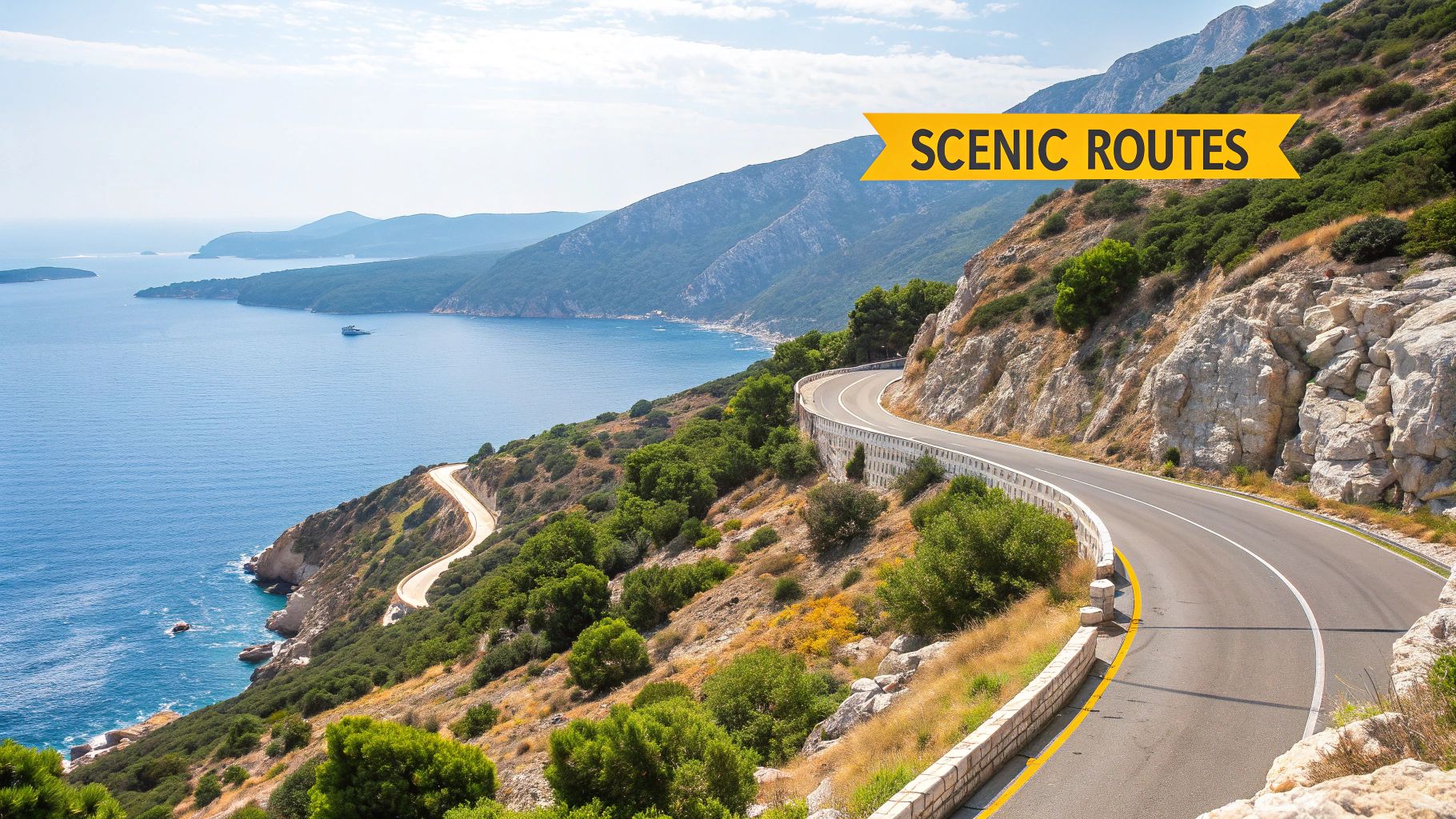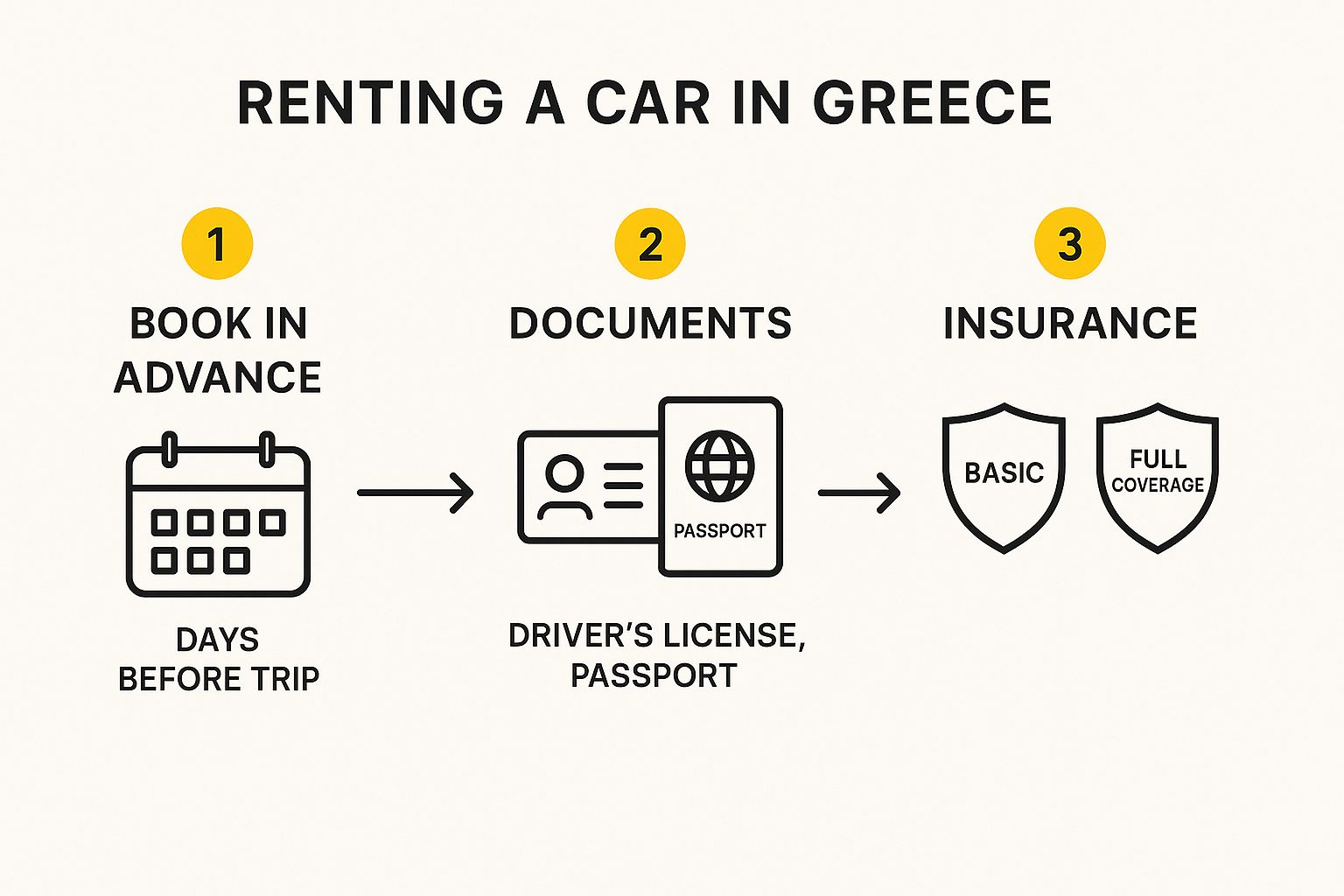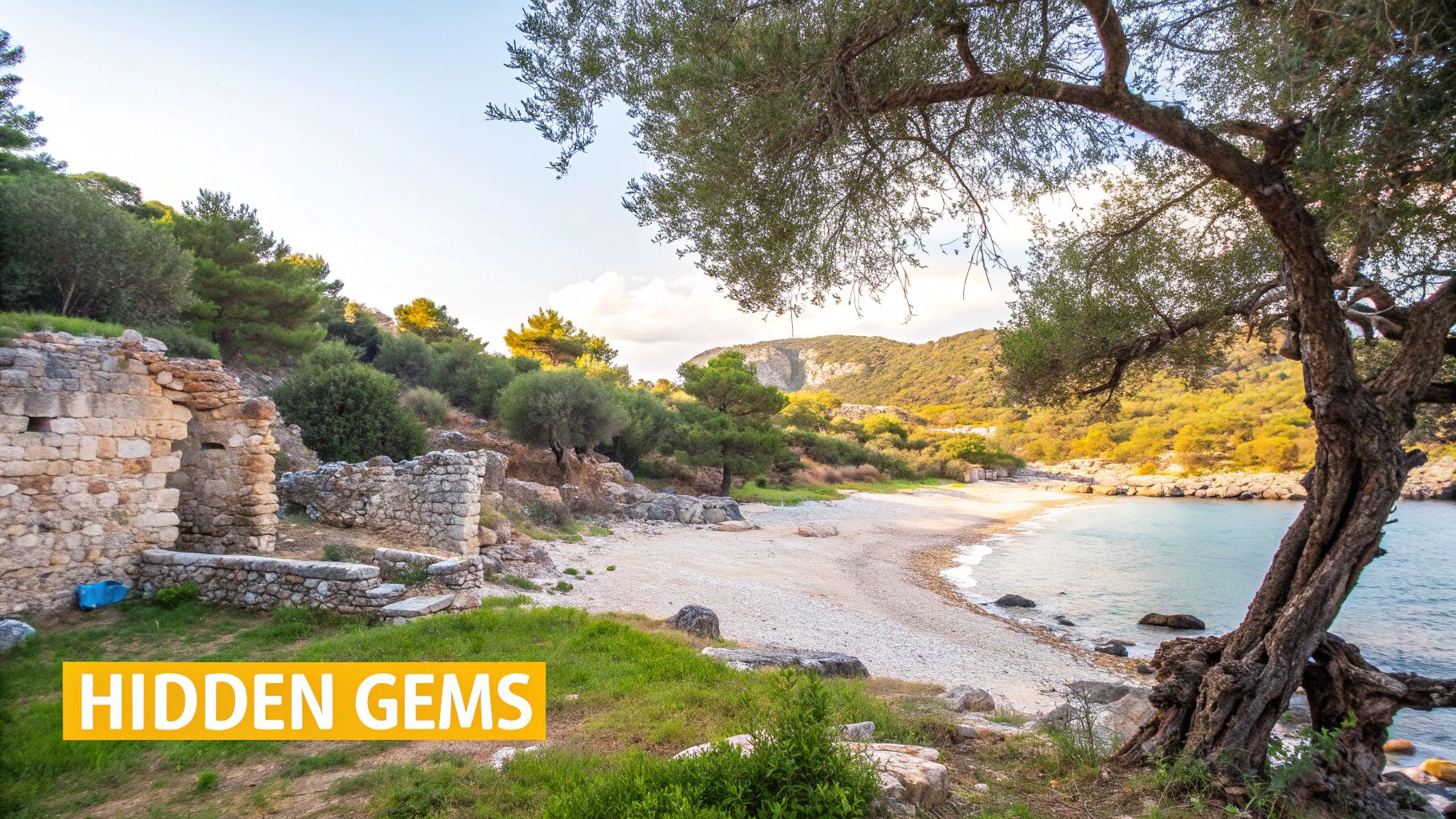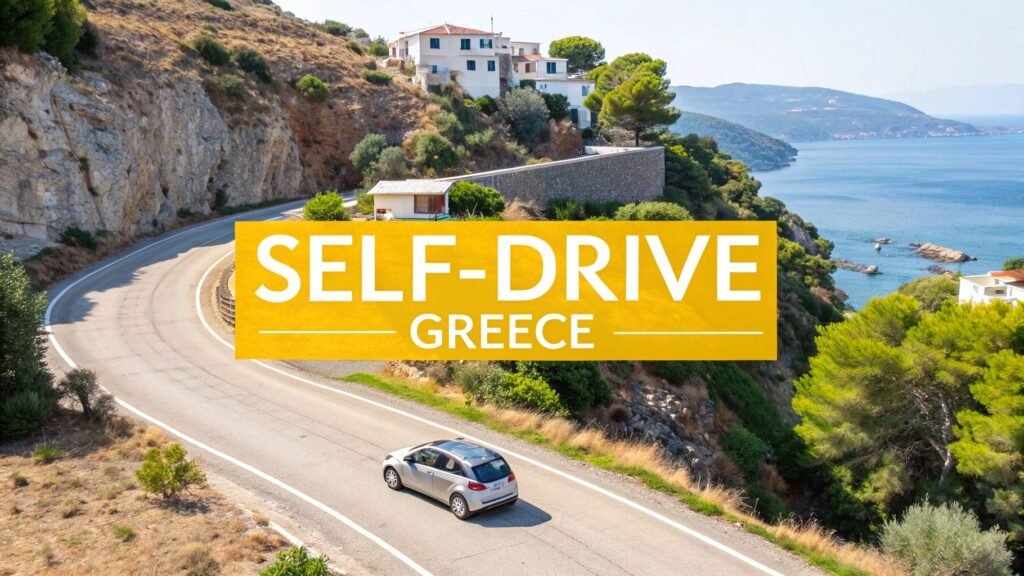Picture this: leaving the crowds behind and discovering Greece entirely on your own terms. A self-drive holiday gives you the freedom to find that hidden cove on Crete’s coast, linger just a little longer over lunch in a Peloponnese mountain village, or chase a sunset down an unmarked coastal road. This isn’t just about getting from A to B; it’s about genuine discovery. Let’s explore self-drive holidays in Greece.
Why a Road Trip Is the Best Way to See Greece
Forget rigid schedules and being herded onto a tour bus. A road trip is your personal key to unlocking the real heart of Greece. It’s what turns a good holiday into a brilliant one, handing you the reins to create a journey packed with spontaneous detours and real cultural connections. It’s the difference between just seeing a country and actually experiencing it.
This way of travelling means you set the pace. You can spend an extra hour at an archaeological site that has you captivated or take an impulsive turn-off to a village that simply looks interesting on the map. There’s absolutely no pressure to move on until you’re ready.
Embrace Spontaneity and Authentic Discovery
The real magic of a self-drive holiday in Greece is found in those unplanned moments. It’s stumbling upon a local panigiri (a lively village festival), buying fresh honey from a beekeeper at the side of the road, or finding the perfect deserted beach just by following a dusty track. These are the kinds of memories that pre-packaged tours can never offer.
Having a car gives you access to the Greece that exists beyond the postcards. It lets you connect with the landscape, the people, and the culture on a much deeper, more personal level, turning your holiday into a story you’ll be telling for years.
It’s no surprise this independent style of travel is gaining traction, especially with UK holidaymakers. Greece is consistently a top pick, with ABTA’s latest report showing it commands an 11% market share among British travellers. The autonomy of a self-drive tour fits perfectly with the growing desire for personalised itineraries and stays in charming, family-run B&Bs. You can read more about British travel trends to Greece and dig into the details in the full report.
Key Advantages of a Greek Road Trip
Getting behind the wheel offers some clear benefits that will completely change your trip for the better:
- Ultimate Flexibility: Change your mind on a whim. If you fall in love with a town, you have the freedom to stay another night without throwing a group schedule into chaos.
- Access to Hidden Gems: You can reach remote monasteries, secluded beaches, and tiny mountain villages that are completely off-limits to public transport or large tour coaches.
- Deeper Cultural Immersion: Staying in smaller towns and eating at local tavernas offers a much more authentic window into Greek life, far from the main tourist hubs.
- Cost-Effective for Groups: For families or a few friends travelling together, hiring a car can often work out cheaper than buying individual bus or train tickets for every leg of the journey.
Crafting Your Perfect Greek Road Trip Itinerary

The open road in Greece isn’t just a stretch of tarmac; it’s your personal gateway to thousands of years of stories just waiting to be uncovered. This is where the real adventure begins—planning your route and watching a vague idea blossom into an exciting, tangible journey. The absolute best part of a self-drive holiday is the freedom it gives you to mould any itinerary to fit your own clock and passions.
It’s best to think of the routes we suggest not as rigid timetables, but as well-trodden templates for an incredible experience. They’re designed as starting points, offering a logical flow while hitting the absolute must-see destinations along the way. Whether you’re a history enthusiast keen to trace the footsteps of ancient heroes, a sun-worshipper chasing that perfect coastal sunset, or a foodie on a mission for the most authentic moussaka, there’s a journey here for you.
We’ve laid out three distinct itineraries, each serving up a unique slice of Greece. You can follow one from start to finish or—even better—cherry-pick your favourite bits from each to build a road trip that’s entirely your own.
The Classical Mainland: A Journey Through Time
For anyone captivated by ancient history and jaw-dropping landscapes, the classical mainland route is nothing short of a pilgrimage. This journey strings together some of the most significant archaeological sites in the world, whisking you from the electric buzz of modern Athens to the spiritual, sky-high monasteries of Meteora.
Your adventure will likely kick off in Athens. Give yourself a day or two to soak up the classics like the Acropolis and get lost in the charming lanes of the Plaka district before you pick up your hire car. From there, your first major destination is the Peloponnese peninsula, a region completely drenched in myth and legend. This is where you’ll find the very places that shaped Western civilisation.
Here’s a rough sketch of how this route could unfold:
- Olympia: Stand on the hallowed ground where the first Olympic Games were held. You can even run on the original track.
- Delphi: Visit the mystical sanctuary of Apollo, a place the ancients believed was the very centre of the world.
- Meteora: Gaze up in wonder at the breathtaking monasteries built precariously on top of immense natural rock pillars.
This route is a true masterclass in Greek history. It’s like driving through a living museum, where every bend in the road reveals another chapter in a story that has captivated the world for millennia. And the drive itself? Absolutely spectacular, winding through rugged mountains and endless olive groves.
This trip is about so much more than just ruins; it’s about witnessing how ancient history and modern life intertwine. You’ll pass through delightful mountain villages like Arachova near Delphi—perfect for an overnight stop—and truly experience the profound beauty of the Greek interior. For a ready-made example of how these legendary spots can be woven together, take a look at our classic 8-day self-drive tour, which offers a perfectly paced journey through Greece’s celebrated heartlands.
Myths And Mountains Of The Peloponnese
If you’d rather dive deep into one region and get to know it properly, the Peloponnese is a universe all its own. Technically an island since the Corinth Canal was cut, this vast peninsula is a rich tapestry of ancient legends, medieval ghost towns, jagged mountains, and untouched coastlines. It’s often less crowded than the famous islands but is every bit as beautiful and intriguing.
A road trip here feels like a genuine exploration. You could start by crossing the canal and making a beeline for Nafplio, which is arguably one of Greece’s most gorgeous seaside towns. With its commanding Venetian fortresses and elegant neoclassical mansions, it serves as an excellent base for a few days.
From Nafplio, it’s easy to map out a loop that takes in the region’s diverse treasures:
- Mycenae & Epidaurus: Explore the mighty citadel of Agamemnon and then sit in the astonishingly preserved ancient theatre of Epidaurus, famous for its perfect acoustics.
- Mystras: Wander the hauntingly beautiful ruins of this Byzantine fortress-city, a UNESCO World Heritage site clinging to a steep mountainside.
- Monemvasia: Discover the incredible “Gibraltar of the East,” a medieval castle town carved into a colossal sea rock, completely invisible from the mainland.
- The Mani Peninsula: Drive through the stark, dramatic landscapes of the Mani, a region known for its unique stone tower houses and wildly beautiful coastline.
This journey is ideal for travellers who love mixing history with a healthy dose of nature. The driving itself is a reward, with roads that hug the sparkling coast one minute and climb through breathtaking mountain passes the next.
Crete: A Coastal Explorer’s Dream
For sun-seekers who crave variety, a road trip around Crete is the ultimate answer. As Greece’s largest island, it offers an incredible diversity of scenery, from the palm-fringed beaches of the south to the immense, shadowy gorges of the interior. A car isn’t just a good idea here; it’s essential for unlocking the island’s best-kept secrets.
You can fly into either Chania or Heraklion and plan a circular or one-way route. Many people start in the west, falling for the Venetian charm of Chania’s old town and harbour. From there, the island is your oyster.
Your Cretan adventure could easily include stops like these:
- Elafonisi Beach: World-famous for its incredible pink-tinged sands and shallow, turquoise, lagoon-like waters.
- Balos Lagoon: A breathtakingly beautiful and remote beach that’s often reached via a dirt track—making the drive part of the adventure.
- Samaria Gorge: For more active travellers, tackling the hike through one of Europe’s longest gorges is an unforgettable achievement.
- Knossos Palace: Journey back to the heart of the Minoan civilisation at this sprawling and fascinating archaeological site near Heraklion.
Driving in Crete gives you the keys to escape the bustling resorts on the north coast and discover the quieter, more traditional south. Here, you’ll stumble upon secluded coves, welcoming seaside tavernas, and a pace of life that encourages you to slow down and simply savour the moment. It’s a road trip that strikes the perfect balance between relaxation, culture, and pure adventure.
Sorting Your Car and Driving in Greece
Right, let’s get into the nuts and bolts of hiring a car and actually driving in Greece. Getting this bit right is the foundation of a brilliant, stress-free road trip, so we’ll walk through everything you need to know to get on the road with total confidence.
Think of this as your practical guide to the whole process. We’ll cover everything from picking the right set of wheels for your adventure to understanding the local driving quirks.
This visual gives you a quick, at-a-glance idea of the key steps.

As you can see, it really boils down to three things: planning ahead, getting your documents sorted, and knowing your insurance options. Nail these, and you’re set for a smooth ride.
Booking Your Ideal Vehicle
Picking the right car isn’t just about finding the cheapest deal; it’s about matching the car to your journey. If you’re tackling the winding mountain roads of Zagori or Crete, a smaller, nimble car is a far better bet than a big saloon. You’ll be grateful for it when you’re navigating narrow village streets and trying to squeeze into a tight parking spot.
Of course, if you’re travelling with the family or have a mountain of luggage, an estate or a small SUV makes more sense for the extra space. Most rental firms in Greece have a decent selection, but the golden rule is to book well in advance, especially if you’re travelling in the peak months of July and August. Getting in at least three months early usually means better prices and more choice.
You’ll find all the big international and local rental companies at major airports like Athens (ATH) and Thessaloniki (SKG), which makes picking up and dropping off the car a breeze. Always compare prices online, but really scrutinise what’s included in that final figure.
A word of warning: the cheapest headline price is rarely the best value. Always check for hidden costs like extra drivers, GPS hire, or one-way rental fees. That great deal can suddenly look a lot less appealing once you add on all the extras you actually need.
Understanding Insurance and Documentation
Car hire insurance can seem like a minefield, but it’s fairly straightforward once you break it down. Your standard rental in Greece will almost always include a basic Collision Damage Waiver (CDW). The catch? It usually comes with a massive excess—the amount you have to pay if there’s any damage—which can easily be over €1,000.
To avoid a panic over a minor scratch, you’ve got a couple of options. You can buy a Super Collision Damage Waiver (SCDW) or a zero-excess policy from the rental company itself. A smarter, often cheaper, alternative is to get a separate car hire excess insurance policy before you go. These are widely available in the UK and can cover you for an entire year for a fraction of the cost.
To make sure everything goes smoothly when hiring your car, here’s a quick checklist of what you’ll need and why.
Car Hire Checklist for Greece
| Checklist Item | Why It Matters | Pro Tip |
|---|---|---|
| Valid Driving Licence | You obviously can’t hire a car without it. Your UK photocard is fine. | Double-check the expiry date well before you travel. |
| International Driving Permit (IDP) | Some, but not all, rental companies might ask for this. | It’s cheap and easy to get from the Post Office. Better to have it and not need it. |
| Passport | Standard proof of identity required by all hire companies. | Keep a digital copy on your phone as a backup. |
| Credit Card (Main Driver) | This is for the security deposit. Debit cards are rarely accepted. | Ensure your credit limit can cover the deposit, which can be held for weeks. |
| Booking Confirmation | Have a printed or digital copy to avoid any disputes over the price or car model. | Read the terms and conditions again before you leave home. |
Having these items ready will speed up the collection process and get your holiday started without any hitches.
For those planning to head off the beaten track, like on the rugged routes in our hiking and driving guide through Zagoria and Meteora, it’s well worth checking if your insurance covers damage to the tyres and undercarriage.
Mastering the Rules of the Greek Road
Driving in Greece is perfectly safe, but the local style can feel a bit more… spirited than what you might be used to back home. First and foremost, remember they drive on the right-hand side of the road, and you overtake on the left.
The motorways, known as ethniki odos, are generally modern and in great condition, especially the main arteries like the A1 connecting Athens and Thessaloniki. These are toll roads, and you’ll need cash at the toll booths, so keep some change in the car. A drive from Athens to Thessaloniki, for instance, will set you back about €30-€40 in tolls.
Once you get into towns and villages, the roads can get incredibly narrow. Local drivers are used to it and might seem a bit pushy, but just take a breath, drive defensively, and go at a pace you’re comfortable with. Parking in historic centres can also be a nightmare; your best bet is to look for a designated public car park on the edge of town.
It’s also a good idea to have a few essentials with you, just in case. A portable car tire inflator can be a real lifesaver on a quiet country road.
A few key rules to keep in mind:
- Speed Limits: It’s 50 km/h in towns, 90 km/h on open roads, and up to 130 km/h on motorways.
- Drink Driving: The limit is a strict 0.05% blood alcohol content—lower than in England and Wales. Honestly, the only safe rule is not to drink at all if you’re driving.
- Mobile Phones: It’s illegal to use your phone without a hands-free kit while driving, and the fines are hefty.
- Roundabouts: This one catches a lot of people out. Traffic entering the roundabout usually has priority over those already on it. It’s the opposite of the UK rule, so approach with caution
Finding Authentic Accommodation Along Your Route

One of the real pleasures of a Greek road trip is the freedom to sidestep the usual, predictable hotel chains. Having your own car doesn’t just get you from A to B; it unlocks a world of unique, character-filled places to stay. Suddenly, your overnight stop isn’t just a bed for the night—it becomes a highlight of the journey. Forget generic rooms and think more along the lines of charming, family-run guesthouses, seaside apartments with breathtaking views, or elegant boutique hotels tucked away in historic town centres.
Choosing where you lay your head is a brilliant opportunity to get a real feel for the local culture. When you stay in smaller, independent places, you often find a much warmer welcome, enjoy proper home-cooked breakfasts, and get fantastic tips from owners who genuinely love their corner of Greece. This is where you’ll hear the stories that never make it into the guidebooks and truly experience philoxenia—that famous Greek generosity towards strangers.
Embracing Local Charm and Value
Opting for more authentic spots isn’t just about the experience; it’s a canny move for your wallet, too. Greece has long been a favourite for British holidaymakers, and YouGov data shows it ranks highly for both quality and value. This is especially true once you drive away from the major tourist hubs. A self-drive holiday really opens up a world of high-quality, affordable places to stay. You can learn more about why British travellers value Greece so highly and see how it shapes their travel plans.
A bit of smart planning with your overnight stops goes a long way. Try booking your accommodation in smaller towns or villages just on the outskirts of the main tourist draws. You’ll almost always find better prices, easier parking, and a far more relaxed atmosphere, all while being just a short drive from the big sights.
Types of Authentic Greek Accommodation
Once you start exploring beyond the main resorts, you’ll discover a fantastic range of places to stay, each offering its own distinct taste of Greece. As you map out your route, keep an eye out for these gems:
- Xenones (Guesthouses): These are the heart and soul of Greek hospitality. You’ll typically find them in beautifully restored old buildings in mountain villages or historic towns. They’re almost always family-run, which means cosy rooms, rustic charm, and a genuinely personal welcome.
- Seaside Apartments & Studios: A classic choice, especially on the islands and along the coast. Renting a self-catering apartment gives you so much flexibility. Imagine having breakfast on your own balcony overlooking the sea or whipping up a simple meal with fresh ingredients from the local market.
- Boutique Hotels: In beautiful towns like Nafplio or Chania, you’ll find exquisite boutique hotels hidden inside old neoclassical mansions or Venetian townhouses. They do a brilliant job of blending modern comforts with historic character, giving you a stylish and intimate base to explore from.
- Agrotourism Stays: If you want a truly immersive experience, think about staying on a working farm or estate. These places offer a peaceful escape to the countryside where you can learn about local produce like olive oil and wine, and savour meals made from ingredients grown right outside your door.
Experiencing Greek Culture Like a Local
Your hire car is more than just a way to get from A to B; it’s your ticket to the real heart of Greece, far beyond the manicured tourist trails. A self-drive holiday gives you the freedom to sink into the rhythm of daily life, turning the simplest moments into the most memorable parts of your trip.
The authentic Greece isn’t found on a rigid schedule. It’s in the spontaneous detours: pulling over at a roadside stall to buy figs and honey from the farmer who grew them, following a hand-painted sign to a tiny fishing village for the freshest calamari imaginable, or stumbling upon a local festival you never knew was happening.
The Soul of Greece: The Taverna
A Greek taverna isn’t just a restaurant. It’s the community’s living room, a hub of connection, celebration, and, of course, incredible food. Having a car means you can hunt down those hidden gems tucked away in mountain villages or by secluded coves, places where family recipes have been perfected over generations.
Don’t hesitate to ask for the day’s special. More often than not, it’s a regional delicacy you won’t find on a tourist menu. In Crete, for example, keep an eye out for dakos (a glorious barley rusk salad), while in the Peloponnese, you might be treated to succulent roast pork with celery.
This is where you’ll truly experience philoxenia—the famous Greek concept of hospitality. It’s not just a word; it’s the genuine warmth in a smile, the extra carafe of wine that appears on the house, and the feeling that you’ve been welcomed as an old friend, not just another customer.
Embracing Local Customs and Language
A little bit of Greek goes a very long way. You don’t need to be fluent, but learning a few key phrases is a sign of respect that will be met with warm smiles. Mastering a simple greeting like “Yia sas” (hello) and a thank you, “Efcharisto”, can completely change your interactions.
Many self-drive routes will lead you to historic monasteries, like the breathtaking complexes of Meteora or those dotted across the Dodecanese islands. Remember, these are active places of worship, so dressing modestly is essential. This usually means covering your shoulders and knees—most sites offer wraps at the entrance if you’re caught unprepared. Exploring the distinct culture of the islands offers its own set of rewards, as we cover in our guide to island hopping from Kos to Patmos.
Discovering Village Festivals, or ‘Panigiria’
If your timing is right, you might just stumble upon a panigiri. These are vibrant village festivals, usually held to celebrate a patron saint, and they offer an incredible window into local life. Picture live traditional music, dancing that carries on late into the night, and long tables groaning under the weight of fantastic food and local wine.
You won’t find these events advertised in tourist brochures. You’re far more likely to discover one by following the sound of music drifting across a valley or by asking a local in a coffee shop. It’s in these unscripted moments—sharing a dance with a total stranger or raising a glass with newfound friends—that a self-drive holiday transforms from a simple trip into a deep, unforgettable cultural immersion.
Tailoring Your Trip for Your Travel Style
A truly great road trip should feel like it was made just for you, fitting your pace and passions like a glove. This is where a self-drive holiday in Greece really shines, giving you the freedom to build a journey that’s perfect for you—whether you’re bringing the kids along, planning a romantic escape, or chasing an adrenaline rush. The whole secret is to match the route and the activities to what you actually enjoy.
It’s clear more and more people are craving this kind of independence. Recent UK travel data shows a big jump in solo trips and small group holidays, with the average number of insured people per trip now just 1.3. This really points to a desire for the kind of freedom a Greek road trip offers, especially for Gen Z and millennial travellers looking for genuine adventure and cultural experiences. You can dive deeper into these evolving UK holiday patterns to see just how much flexible travel is shaping modern journeys.
Adventures for Families and Children
For families, a road trip through Greece is a brilliant way to make history feel alive and exciting. The Peloponnese region is a fantastic choice, serving up a perfect blend of easy-to-reach ancient sites and gorgeous beaches. Think about planning routes with shorter driving days and plenty of stops at places that will capture young imaginations, like the ancient stadium at Olympia where they can actually run on the original track.
When you’re booking your car, don’t forget to request the right child seats. It’s a legal requirement in Greece for children up to 12 years old or under 1.35 metres tall. You’ll find that many coastal areas, like those around Nafplio or on the island of Crete, have calm, shallow waters that are absolutely perfect for little ones.
Planning a family road trip is like directing a play. The secret is to keep the scenes short, engaging, and varied. Mix a morning exploring ruins with an afternoon building sandcastles to keep everyone happy and create lasting memories.
Romantic Escapes for Couples
Couples will find romance around every corner on a Greek road trip. You could plan a route through the wild, dramatic landscapes of the Mani Peninsula, staying in beautifully restored stone tower houses that have been turned into unique boutique guesthouses. The drive itself, with its winding coastal roads and jaw-dropping sea views, becomes a huge part of the experience.
Look for routes that take you to wonderfully charming towns like Monemvasia, or down to the Venetian harbour of Chania in Crete. These places are made for evening strolls along cobbled streets, intimate dinners at seaside tavernas, and finding that perfect spot for a sunset toast overlooking the Aegean.
Thrills for the Adventurous Traveller
If you’re after a proper adventure, Greece’s rugged interior offers challenges and rewards in equal measure. A drive through the Pindus Mountains to the Zagori region will take you along some of Europe’s most spectacular and demanding roads. The area is a hiker’s paradise, home to the Vikos Gorge—one of the world’s deepest canyons.
In the same way, Crete’s interior serves up some thrilling drives through mountainous terrain, leading to trailheads for incredible hikes like the Samaria Gorge. For the real thrill-seekers, there are also plenty of hidden spots for watersports, from windsurfing on the southern coast of Rhodes to sea kayaking around the secluded coves of the Ionian Islands.
Common Questions About Driving in Greece

Before you hit the road, it’s natural to have a few questions buzzing around. Let’s tackle some of the most common queries we hear from travellers, so you can feel completely at ease and ready for your Greek driving adventure.
Getting these little details sorted is the final step in planning. Once you know what to expect, you can stop worrying about the ‘what ifs’ and start dreaming about the open road.
Do I Need an International Driving Permit?
This is probably the number one question we get, and thankfully, the answer is straightforward. Since the UK is no longer in the EU, the rules have shifted slightly. Your UK photocard licence is still valid in Greece, but we highly recommend getting an International Driving Permit (IDP).
Why? Well, some car hire companies might ask for it, and it just makes life easier if you’re ever stopped by the police. For a few quid and a quick trip to the Post Office, an IDP provides that extra layer of confidence. Think of it as a small bit of paperwork for total peace of mind.
How Challenging Are Greek Roads?
It’s a real mix, but nothing an experienced driver can’t handle. The major motorways, like the ones linking Athens and Thessaloniki, are modern toll roads and an absolute breeze to drive on. They’re well-maintained and just as good as anything you’d find elsewhere in Europe.
The real adventure begins when you venture onto the rural or island roads. These can be narrower, with plenty of twists, turns, and the odd steep climb. The secret is simply to take your time. Don’t feel pressured by locals who navigate these routes every day; just drive at a pace that feels comfortable for you and soak in the incredible scenery.
The way I see it, the big motorways are for getting from A to B. The smaller country lanes? They are the adventure.
Can I Take a Hire Car on a Ferry?
Yes, you absolutely can, but there’s a crucial step you can’t miss: you must get prior permission from your car hire company. Most agencies are fine with it, but you’ll almost certainly need to purchase specific ferry insurance or an extra waiver. This is because your standard insurance cover usually becomes void the second the car is loaded onto a boat.
Make sure you declare your island-hopping plans right from the start when you book the car. If you don’t, and something happens during the crossing, you could find yourself responsible for the entire value of the vehicle.
What Is the Best Time of Year for a Road Trip?
If you’re looking for that perfect sweet spot of lovely weather without the crowds, aim for the “shoulder seasons.”
- April to June: Spring is just magical. The landscape is incredibly green, wildflowers are everywhere, and the temperatures are ideal for wandering around ancient ruins without breaking a sweat.
- September to October: The summer heat has subsided, but the sea is still beautifully warm. Most of the peak season tourists have gone home, leaving the roads and sights much quieter.
By travelling in these months, you dodge the scorching heat and holiday traffic of July and August, which honestly makes for a far more pleasant and relaxing drive.
Ready to map out your own Greek odyssey? BTOURS designs incredible self-drive holidays that let you discover the real Greece on your own terms. Find your perfect route today at https://www.btours.com.



